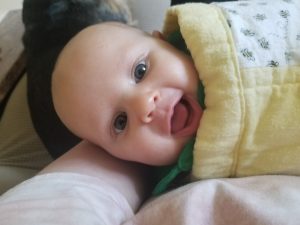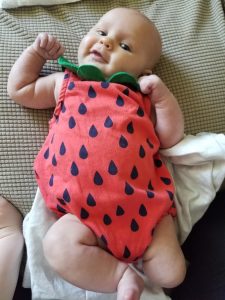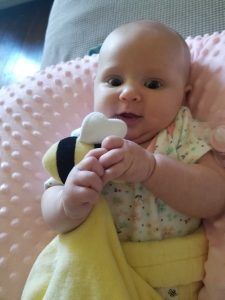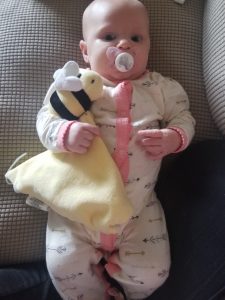The ASQ and Delilah’s New Lovey

After Delilah’s two-month well-baby check-up, the Pollywog staff asked if an ASQ screening was done during the visit. And after finding out that one had not been done, they helped me to do the two-month ASQ at home.
The Ages and Stages Questionnaire (ASQ) is a developmental screening tool that helps parents and professionals see a child’s developmental and social-emotional progress. They can be done regularly from one month of age to five and ½ years.

Often, a pediatrician or other healthcare worker, home visitor, or teacher will provide parents with the ASQ form to fill out. I think that it wasn’t done at the visit because of COVID-19, the doctors are trying to keep visits as short as possible to limit babies and kids exposure.
I may have been a little confused because I thought this was going to be a way more involved process where I’d have to do activities to see her development. After getting her dressed in something comfortable, I brought all her stuff out to the living room. But I really could have done the screening while lying in bed!
The ASQ for two-months is a super simple questionnaire that asks about your interactions with your baby and what you’ve noticed as their parent.

The questions were in 5 categories: communications, gross motor, fine motor, problem-solving, and personal/social. The responses to the questions were simple as well, only yes, no, or sometimes.
The simple response options were what I liked. When there are more detailed options, like a number scale from 1-10, I spend way too long stressing on whether 6 or 7 is a more accurate response. I tried to not stress too much on each response!

After going through the questionnaire, it generated a report that summarized how Delilah is developing. There was a bar graph to show her scores along with reference ranges for typical development. In the chart, Delilah’s scores are the stars on the right-hand side.
If a score was outside the typical range, in the grey middle area or dark left area, that would indicate that more activities could help her in that area or that professional screening may be recommended. It’s reassuring to see that there is a wide-range for typical development, and often easy activities will help a child learn the skill in question.
Overall Delilah scored really well in all the categories. Her lowest score was in the problem-solving category. Most of those questions were about her interaction with toys and her ability to follow them with her eyes. So, we’re just going to have to add in some extra playtime, and that shouldn’t be too hard!
 Speaking of toys, we decided it is a good time to introduce Delilah to her lovey, Burt. We received the cutest little bee lovey from Burt’s Bees (why we call it Burt) at our baby shower. I read that introducing a lovey to your baby can help with better sleep because it provides a feeling of security.
Speaking of toys, we decided it is a good time to introduce Delilah to her lovey, Burt. We received the cutest little bee lovey from Burt’s Bees (why we call it Burt) at our baby shower. I read that introducing a lovey to your baby can help with better sleep because it provides a feeling of security.
We hope that if she is attached to a lovey then it might help when it comes time to transition her off the pacifier. Loveys aren’t recommended for sleep until babies get a little older due to SIDS risks, but we have started to give it to her during the day at feeding times. We picked feeding times instead of play times after reading online that sometimes a baby will see the lovey as a plaything if introduced during playtime.
For more information on The Ages and Stages Questionnaire: